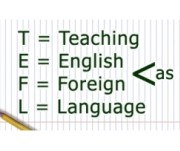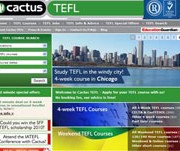TEFL courses in London & the UK: what you need to know
The world of TEFL can be daunting for those starting out, but with the right guidance and the right course it can open the door to a whole new chapter of life.
For many people, a TEFL (Teaching English as a Foreign Language) course is a great way to discover foreign climes whilst being paid for it. It is a passport to world travel that grants you real immersion in a culture and the ability to make a difference. From graduates to those taking a career break and retirees, TEFL is popular with all ages and walks of life.
You can of course take your TEFL course in the country where you hope to find future employment as a teacher. Many people choose to first qualify in their country of origin, and for those in the UK the choice is vast. With a large number of online, part-time and full-time TEFL courses on offer nationwide, and start dates every month, you can easily find a course to suit your needs, lifestyle and budget. The main qualifications to look out for are Cambridge CELTA and Trinity CertTESOL, as these are the two internationally recognised and accredited TEFL courses that many schools across the globe will expect from job seekers.
TEFL courses in London
One of the most popular UK locations to take a TEFL course is of course London. Each year the vibrant, cosmopolitan capital attracts students of all nationalities to its many teacher training centres spread across the city. Taking your TEFL course in London is guaranteed to be a brilliant experience, with world class entertainment on your doorstep – a welcome break from studies – and numerous course formats to ensure your needs are met. Whether you want an intensive 4-week TEFL course in London or a part-time 12-week course in London, the vast choice of TEFL schools in London will ensure there is something for you.
There is also the option to take a blended CELTA course (13 weeks part-time), which combines valuable face-to-face teaching practice with online CELTA training. This is a great option if you don’t have time to access the full face-to-face course, as online CELTA materials will be accessible any time that suits you. Saving on accommodation and travel costs may also be a consideration for some students.
TEFL guidance
With so many courses and locations on offer, you might be unsure which one is right for you or have questions as to the application procedure – all to be expected, especially if TEFL is new to you. Cactus TEFL is a great resource at this point, as it offers a unique admissions and advisory service to aspiring teacher trainees. Working with the majority of well-known course providers worldwide and allowing you to compare accredited TEFL courses and gain masses of impartial advice along the way, you can be sure that by the time you submit your application – which you can do through Cactus – you will fully understand the TEFL process and be confident of your chosen course. All this at no extra price: you pay exactly the same as if you go direct to the school.
Good luck on what is guaranteed to be an exciting, challenging and highly rewarding journey towards becoming a qualified English language teacher!
See below for a list of part-time, full-time and blended TEFL courses in London.
1. Trinity CertTESOL courses in London
Full-time courses:
4-week Trinity CertTESOL course in Russell Square
4-week Trinity CertTESOL course in Greenwich
4-week Trinity CertTESOL course in Bloomsbury
4-week Trinity CertTESOL course in Oxford Circus
Part-time courses:
12-week Trinity CertTESOL in Bloomsbury
13-week Trinity CertTESOL in Oxford Circus
2. Cambridge CELTA courses in London
Full-time courses:
4-week CELTA course in South Molton Street
4-week CELTA courses in Highgate
4-week CELTA course in Queensway
4-week CELTA course in Oxford Street
4-week CELTA course in Covent Garden
4-week CELTA course in Barons Court
Part-time courses:
12-week CELTA course in South Molton Street
12-week CELTA course in Euston
12-week CELTA course in Covent Garden
12-week CELTA course in Barons Court
13-week CELTA course in Oxford Street
Blended courses:
13-week blended CELTA course in Euston
13-week blended CELTA course in Covent Garden
For courses outside London, click here for a full list of TEFL courses in the UK.
















